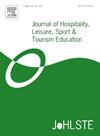推还是拉?美国大学体育管理教师因缺乏归属感而流失的定性分析
IF 4.1
2区 教育学
Q1 EDUCATION & EDUCATIONAL RESEARCH
Journal of Hospitality Leisure Sport & Tourism Education
Pub Date : 2024-12-25
DOI:10.1016/j.jhlste.2024.100533
引用次数: 0
摘要
管理人员、学术带头人和同事通常认为,教职员工被其他大学“挖走”是由于更高的工资或更高的声誉等外部因素(O'Meara et al., 2014)。虽然一些教员可能退休,但其他教员可能被推走或被拉到另一所大学或公共部门任职。本研究采用Zhou和Volkwein的推拉模型来确定体育管理教师是否认为缺乏归属感会影响员工的流失或保留。本定性分析研究结果显示,体育管理教师流失最显著的原因是内部推动因素,如工作环境中的孤立感和歧视经历。相反,高薪等外部拉动因素并不是体育管理专业教师离职的原因。管理人员可以利用这些发现根据需要修改他们的政策和做法,从而使他们的机构对他们想要留住的教师更具吸引力。本文章由计算机程序翻译,如有差异,请以英文原文为准。
Pushed or pulled? A qualitative analysis of university sport management faculty attrition in the United States due to a lack of a sense of belonging
Administrators, academic leaders, and colleagues often believe that faculty members are “poached” by other universities due to external factors like higher salaries or enhanced reputations (O'Meara et al., 2014). While some faculty may retire others may be pushed away or pulled to take a position at another university or in the public sector. This study employed Zhou and Volkwein's push-pull model to determine whether sport management faculty perceived a lack of belongingness influenced attrition or retention.
The results of this qualitative analysis study revealed that the most significant reasons for sport management faculty attrition are internal push factors, such as feelings of isolation in the work environment and experiences of discrimination. Conversely, external pull factors such as higher salaries were not a reason for sport management faculty leaving. Administrators can use these findings to revise their policies and practices as needed thereby making their institutions more attractive to faculty they want to retain.
求助全文
通过发布文献求助,成功后即可免费获取论文全文。
去求助
来源期刊
CiteScore
8.10
自引率
10.80%
发文量
41
审稿时长
42 days
期刊介绍:
The Journal of Hospitality, Leisure, Sport and Tourism Education (JoHLSTE) is the leading international, peer-reviewed educational journal for this subject grouping. Its aims are to: a) Promote, enhance and disseminate research, good practice and innovation in all aspects of higher education in Hospitality, Leisure, Sport and Tourism and Events to its prime audience including teachers, researchers, employers, and policy makers. b) Encourage greater understanding, links and collaboration across its constituent fields. JoHLSTE is designed to have maximum impact through it being available on-line, fully archived and peer-reviewed. JoHLSTE is divided into seven sections: Editorial; Academic Papers; Practice Papers, Perspectives, Comments and Rejoinders, Research Notes and Reports and Education Resource Reviews.

 求助内容:
求助内容: 应助结果提醒方式:
应助结果提醒方式:


